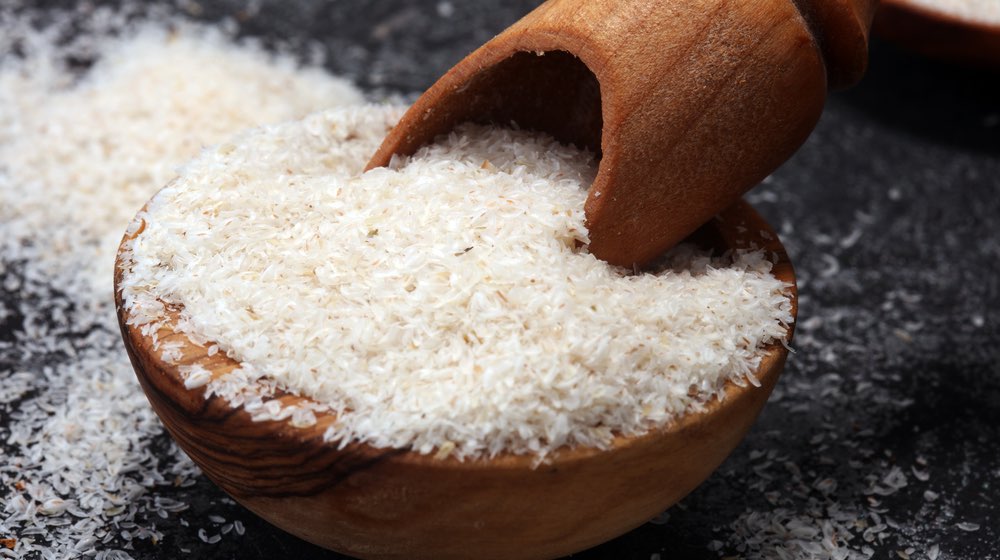Can Expired Food Kill You? 13 Expired Foods That Can Kill You
Can expired food kill you? We've all heard the saying, “When it comes to food, expiration dates are just guidelines.” But do you know some foods can cause life-threatening diseases if consumed past the expiration date?
Find out what happens if you eat expired food and the 13 foods you should never eat past their Expiration Date.
In this Article:
- How to Read an Expiration Date Code
- Food Date Labels
- Are Expiration Dates Real
- Do Eggs Expire
- How Long Do Eggs Last After Expiration Date
- Can You Eat Expired Eggs
- 13 Foods You Should Never Eat Past the Expiration Date
- Can Expired Food Kill You
Related: Eating Fast Food Everyday | Which Fast Foods Have the Most Toxins?
Can Expired Food Kill You
Click here to jump to the infographic
Are Expiration Dates Real

Let's start with a surprising fact: Not all food package expiration dates indicate that it is time to discard the product. In some cases, expiration dates are intended for store owners rather than customers.
The sniff test isn't always accurate, especially since many individuals can't tell spoiling by smell alone. Likewise, you can't tell whether food is contaminated with dangerous germs by simply looking at it, smelling it, or tasting it.
How to Read an Expiration Date Code
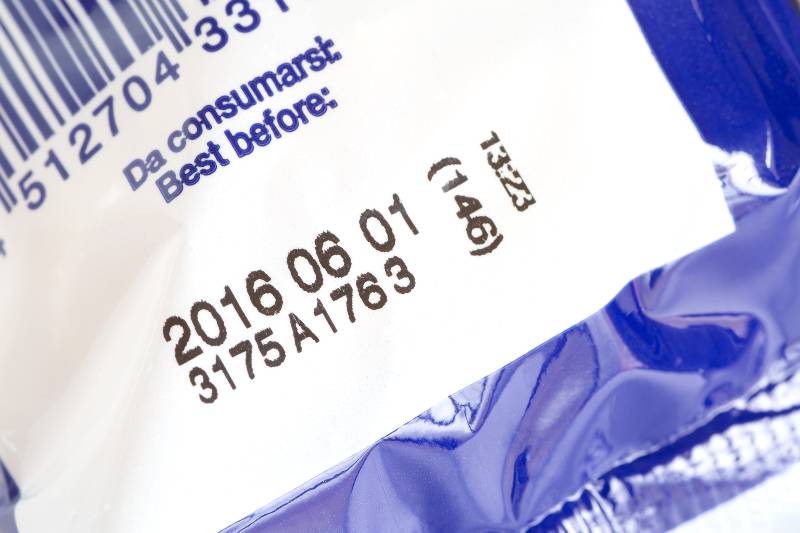
Not all dates on your food label indicate expiry dates.
Here are the usual date labels in your food and what they mean:
Food Date Labels
- The “Best if Used By/Before” date shows when a product's flavor or quality will be at its greatest. It is not a purchase or safety date.
- The “Sell-By” date is a label that indicates how long the store should display the goods for sale to manage inventory. It isn't a safety date.
- The “Use-By” date is the last date suggested for the product's optimal quality. It's not a safety date unless the baby formula is involved.
- A “Freeze-By” date indicates when You should freeze a product to maintain its highest quality. It isn't a purchase or safety date.
Source: Food Safety and Inspection Service (FSIS) of the US Department of Agriculture.
There are no expiration dates on any of these labels, and none of them indicate whether or not food is still safe to consume. The FDA even allows producers to sell any food beyond these dates, except for baby formula.
Food producers are also not required to include any of these dates on their products; it's entirely up to them.
However, the FDA recognizes that these labels are confusing and wants the food industry to adopt a standard phrase: “Best if used by.”

The appearance and odor of food can be deceptive (sniffing the milk carton isn't an exact science), which is why those expiration dates printed on the box may help you avoid sickness.
Unless you want to gamble, it's probably best to toss these foods after they've passed their expiration date, regardless of what they are.
Do Eggs Expire
Egg cartons can have dates printed on them, such as a “best before” or “sell by” date. These dates make it easier to know how old the eggs are.
How Long Do Eggs Last After Expiration Date
If you store them properly, eggs can last far beyond their expiration date and still be safe to eat.
- Eggs can last longer than their expiration date if they are stored properly.
You can store eggs for several weeks after their expiration date, but the quality of the egg will deteriorate over time.
If eggs are properly refrigerated when they expire, they can last up to two or three months if you use them in cooking before this time is up. So, for example, you can still eat an egg after its expiration date if you use it in an omelet, quiche, or pasta dish.
If eggs are stored improperly, they can spoil within days of expiration. Rotten eggs will have a pungent odor, and the white and yolk will be runny and can mix.
If you can't tell if an egg has gone wrong by its smell, try dropping it in a bowl of water to see if the whites are firm or runny. If they spread out across the water's surface, then the egg is spoiled and should be thrown away immediately!
Can You Eat Expired Eggs
It is safe to consume expired eggs. The quality of the egg may deteriorate over time, but it will still be safe to eat. Make sure to store your eggs properly to enjoy them for as long as possible.
If eggs are improperly stored or contaminated, they can go wrong and contain disease-causing germs that might make you sick. In certain situations, it may be harmful to consume expired eggs.
However, even when stored properly, the quality of the egg will begin to deteriorate over time. The yolk can become runny and challenging to cook with, while the white can thin out so much that it no longer provides a structure for an omelet or quiche. The egg can also develop a sour smell and taste over time.
The United States Department of Agriculture (USDA) estimates that one in ten thousand eggs is contaminated with Salmonella bacteria. This can occur during the initial strengthening process and after an egg has been laid if it comes into contact with feces or other contaminants on a farm where chickens are raised and laying their eggs (Source: Trusted Source).
Salmonella is a bacteria that can contaminate eggs and cause food poisoning.
Symptoms of Salmonella poisoning can include fever, diarrhea, and abdominal cramps within 12 to 72 hours after eating the contaminated food. These symptoms can last for several days or weeks. (Source: Trusted Source)
In some cases, particularly in young children, elderly, and those with weakened immune systems, Salmonella can lead to more serious health complications, such as sepsis, meningitis, or even death.
- It is important to store your eggs properly so that they don't spoil.
- If you can, use them within three to four weeks of the expiration date for best results.
- Throw away any eggs that show signs of spoiling or have not been stored properly in your fridge up until their expiration date.
- In addition, thoroughly cook chicken and other meats before eating them to reduce your risk of becoming ill.
13 Foods You Should Never Eat Past the Expiration Date
Here are the 13 common foods to avoid after their “use by” date has passed:
Egg Substitutes

Raw eggs in the shell are safe to store for three to five weeks if kept in the refrigerator.
For egg substitutes that have been opened, it has an average shelf life of three to five days. If they are not opened, you have ten days before they expire.
Egg substitutes have a far shorter shelf life than real eggs. Therefore, it's sounder to get fresh eggs or use up the substitutes as soon as feasible, although both should be consumed promptly.
Don't hesitate to toss out that two-week-old box of whites if you're unsure whether or not to finish it.
Soft Cheeses

Harder cheeses, such as cheddar or gouda, have a longer shelf life in the refrigerator because it's more difficult for germs and mold to break through them. You may store hard and processed cheeses for three to four weeks after being opened.
- If you have to remove a small moldy area from your cheese, cut out a one-inch square around it and use the rest of the cheese.
However, softer cheeses like ricotta, cream cheese, or goat cheese are more prone to germs and should be discarded if they begin to sour or have passed their expiration date, whichever occurs first.
- As a rule of thumb, the softer the cheese, the shorter its shelf life, so cream cheese will only survive for two weeks while ricotta lasts for one week max.
Jarred Condiments
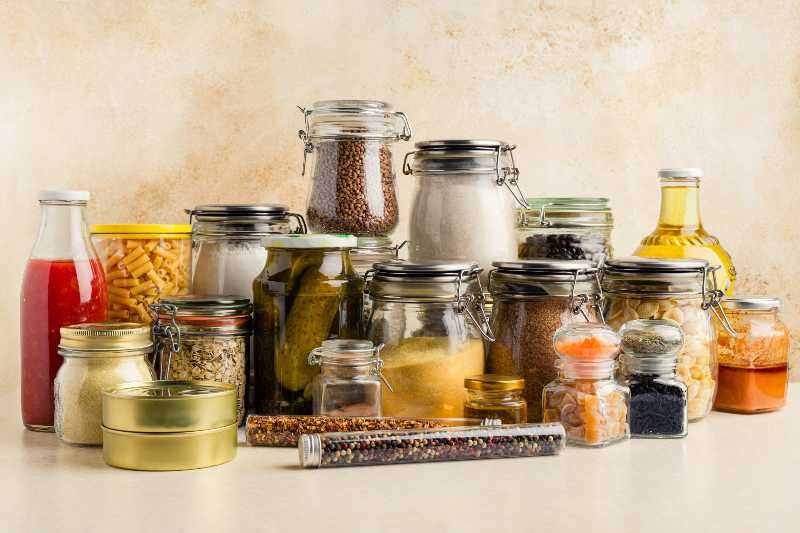
It may appear like spreads and sauces have an eternal shelf life, but just because they're in a glass jar tucked away in the cold fridge doesn't mean bacteria can't touch them.
Once you've opened the lid, the seal is broken, and it should be consumed as soon as possible. The risk of germs grows if you consume it with a dirty knife or spoon.
Furthermore, as we prepare sandwiches, for example, we dip our knife into the spread container and wipe it across the sandwich before returning it to the container. So you're reintroducing some of that germs back into the container by doing so.
- Mustard can last up to a year in the fridge
- Salsa after one month
- Mayo after two months
- BBQ sauce after four months
- Ketchup after six months
Source: New York's Department of Agriculture
If you see water on top, discoloration, or strange odors after refrigerating it for a long time, toss it. While cleaning out the fridge, look at the 16 items you never knew had an expiration date.
Potato Salad

Potato, tuna, and egg salads are more prone to bacterial spoilage since they have a more significant number of exposures.
When you take a few scoops from the container or neglect to remember that the salad has been sitting there for days, these are examples of when these types of salads are more vulnerable.
Once your pasta salad has been tainted, you're more likely to get food poisoning.
We have a safe food system, but we must be more careful when things fall out of temperature or contain germs. Therefore, USDA advises us to be cautious of those things.
Toss deli or homemade salads after three to five days.
Cold-Pressed Juice
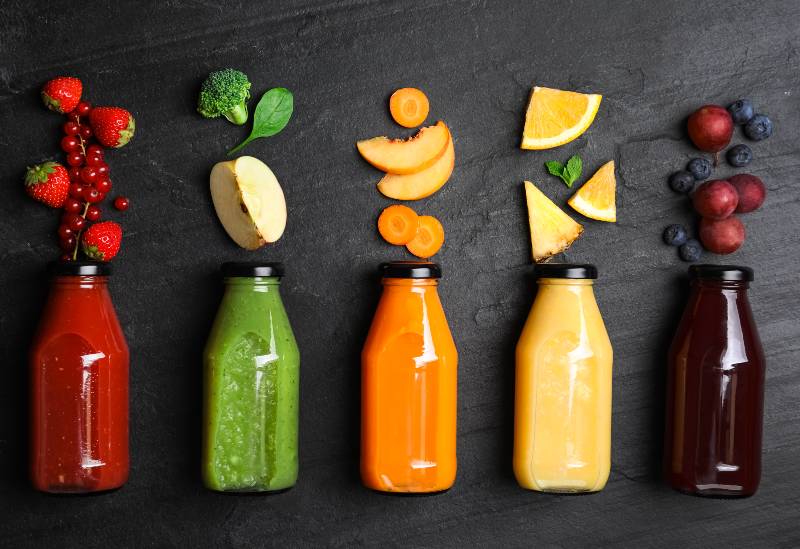
Fresh fruit and vegetable juices have grown in popularity due to their nutritional value, taste, and variety of hues, but they should not take up permanent residence in your refrigerator.
Unlike those that are pasteurized to destroy pathogenic germs and extend shelf life, Raw juices are not pasteurized. As a result, they are considerably more prone to bacterial contamination than traditionally processed juices that have been heat-treated to eliminate harmful bacteria and boost shelf life.
Processed and pasteurized juices have an increased shelf life because all harmful bacteria were destroyed. Drink your raw juice within 48 to 72 hours after purchase.
Some cold-pressed juice is subjected to high-pressure processing, also known as cold pasteurization. Fresh juice can last up to 30 days if treated with this technique, and they'll usually keep for five days in the fridge if properly stored after opening.
- Keep track of the use-by date and any other relevant information on a product's label.
- Throw out all of these food items in your refrigerator-that have passed their expiration dates.
Fresh Meat

Fresh meat is usually accompanied by a “sell-by” date, which informs the store when it can keep that product on the shelves for sale. So what does this imply for you? If you want to eat it now, go ahead; if not, freeze it.
The “sell-by” date informs the store when it should be the last day to have it on their shelf. If it's the final day they can keep it on their shelves, they may even be discounting the food to get rid of it.
Fresh, raw meat is also rife with salmonella, E. coli, and other germs.
In light of this, it's critical to cook the meat at precisely the correct temperatures to destroy the germs.
Ground Meats
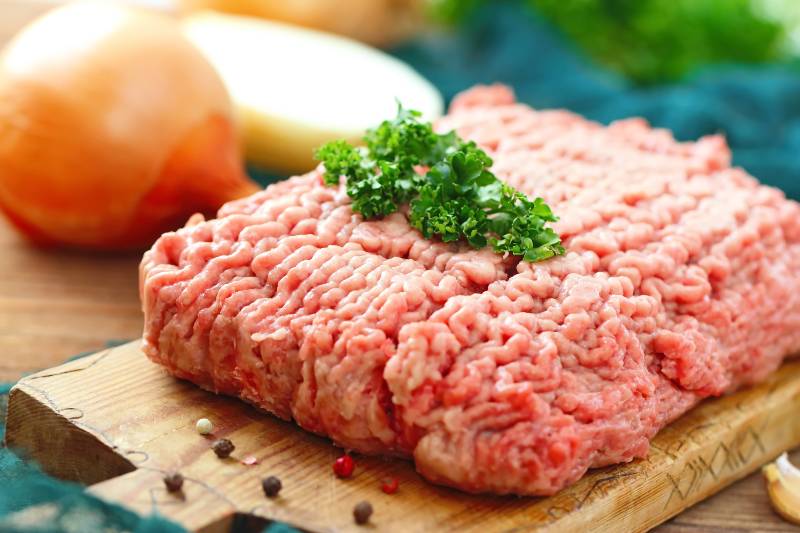
Whether it's beef, pork, turkey, lamb, or any other type, USDA says ground meat should be eaten or frozen within two days of purchase.
Since this is grounded, the bacteria initially on the surface may now be mixed throughout the meat. A Mixed bacteria increases increasing your chance of food poisoning or another illness.
Deli Meat

Ham and turkey slices will only last three to five days ( USDA ). So only purchase what you can buy in that time frame.
Pre-packaged deli meats in airtight packaging will last two weeks longer than fresh-sliced varieties. However, you're working with the same three to the five-day eating window for safe consumption as soon as you open the seal.
Just because it's cold doesn't mean your meat is completely safe. For example, listeria, a kind of germ that can grow in chilly conditions like your refrigerator, can infect deli meat.
Some germs that can harm you cannot be seen, smelled, or tasted. However, if the deli meat is slimy or giving off an odd odor, it's probably time to toss it.
Make sure that the thermometer on your refrigerator is set to below 40 degrees F.
Fish

Fish, like meat, is susceptible to germs and should be consumed within one or two days after purchase. Instead, wrap it in moisture-resistant freezer paper or foil and put it in the freezer for three months or longer.
Fresh Berries

Berries have a short shelf life, whether you buy them from the store or at a farmers' market.
Raspberries and strawberries will only keep for around three days after purchase, while blueberries can last up to a week in the fridge.
Pro tip: Freeze any berries you don't intend to consume before. After that, they become soft and vulnerable to mold growth.
Leafy Greens
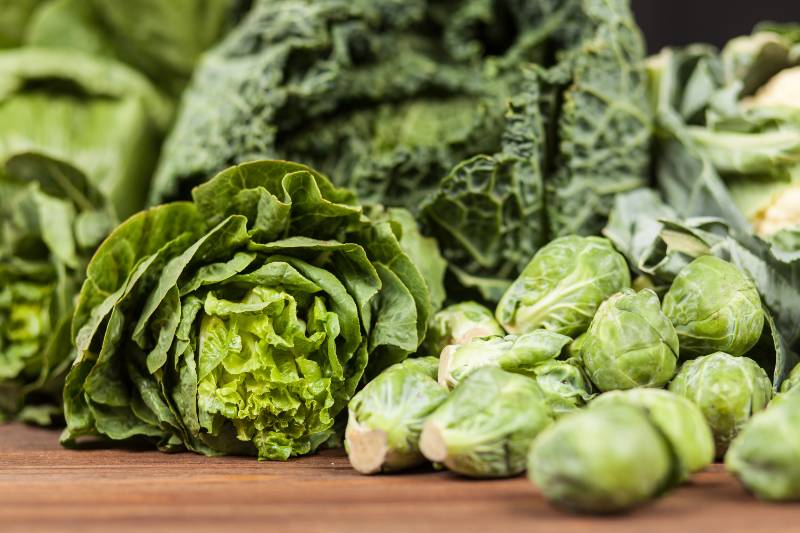
Leafy greens, even those pre-washed and packaged, may still contain germs like E. coli. Therefore, never eat greens after the date on the package has passed and consume them as quickly as possible.
Sprouts

According to the FDA, sprouts are susceptible to germination due to their rapid development and high humidity. In addition, because they are produced in warm and humid air, they are a breeding ground for microorganisms right away.
There's a higher chance of getting sick if you eat them past their recommended date (approximately two days after purchase).
Avoid them if you're pregnant or already sick.
If you're healthy and concerned, Wash or cook them
Shellfish

Raw shellfish, like other seafood, should be refrigerated as soon as possible to prevent germs from developing and causing foodborne illnesses.
Clams, mussels, and oysters should be eaten within five days of purchase, while scallops can survive for only three days at the most. If you detect a foul odor from any seafood, it's time to toss it out.
Can Expired Food Kill You
It's essential to be aware of the expiration dates on your food and understand when it's safe to eat something and when it's not. Although some foods are still okay to eat after their expiration date, others can make you sick.
In general, it's best to avoid eating anything that has expired. However, if you're unsure about a particular food item, don't hesitate to ask a friend or consult an expert.
Here's an infographic guide that you can use. Feel free to download, save and share it with your loved ones:

What Happens if You Eat Expired Food
Check out this video to find out what happens if you eat expired food:
What do you think? Can expired food kill you? Have you ever tried eating expired food? What was your experience? Please share with us in the comment section below.
Trending
Get Updates
SIGN UP FOR OUR NEWSLETTER TODAY

Lecithin Benefits and Side Effects: 10 Surprising Truths
